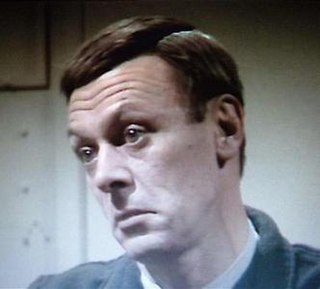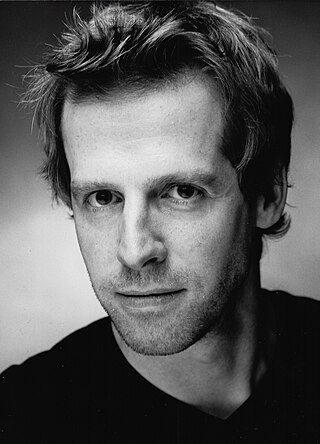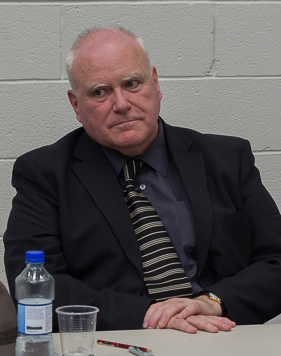Related Research Articles

William Fulton Beith Mackay was a Scottish actor and playwright, best known for his role as prison officer Mr. Mackay in the 1970s television sitcom Porridge.
Peter Blake was a Scottish actor. Probably best known as the character Kirk St Moritz in the BBC sitcom Dear John, by John Sullivan, his other high-profile moments came through his playing of a 'Fonz'-type character in Pepsi-Cola commercials which led to a hit record in 1977 "Lipsmackin' Rock 'n' Rollin", Andy Evol the disc-jockey in Agony with Maureen Lipman for LWT and in an episode of Taggart as Sgt. Bill Kent. He also had a long association with The Rocky Horror Show playing Frank-N-Furter over a thousand times between 1975 and 1994.

John Duncan Macrae was one of the leading Scottish actors of his generation. He worked mainly as a stage actor and also made five television appearances and seventeen films.

John Ogilvie, SJ was a Scottish Jesuit priest. For his work in service to a persecuted Catholic community in 17th century Scotland, and in being hanged for his faith, he became the only post-Reformation Scottish saint.

Adam Russell Hunter was a Scottish television, stage and film actor. He played Lonely in the TV thriller series Callan, starring Edward Woodward, and shop steward Harry in the Yorkshire Television sitcom The Gaffer (1981–1983) with Bill Maynard. He made guest appearances in television series such as The Sweeney, Doctor Who, Taggart, A Touch of Frost, The Bill and The Return of Sherlock Holmes in The Adventure of Silver Blaze.

The National Theatre of Scotland, established in 2006, is the national theatre company of Scotland. The company has no theatre building of its own; instead it tours work to theatres, village halls, schools and site-specific locations, both at home and internationally.

The Appin Murder was the assassination by a concealed marksman of Colin Roy Campbell, the Clan Campbell tacksman of Glenure and Factor for the Forfeited Estates Commission, on 14 May 1752. The murder, which took place on the confiscated estate of Clan Stewart of Appin in Lochaber in the west of Scotland, was an act of violent resistance against the large scale clearances taking place on the estate during the aftermath of the Jacobite Rising of 1745. The assassination led to the trial and execution of James Stewart of the Glens, often characterized as a notorious miscarriage of justice. The murder also inspired events in Robert Louis Stevenson's 1886 novel Kidnapped and its sequel Catriona.
Stuart McQuarrie is a Scottish actor who has starred in several acclaimed films, including Trainspotting and 28 Days Later. Besides numerous film and TV appearances McQuarrie has performed extensively in theatre throughout the UK.
Jimmy Chisholm is a Scottish actor in film, theatre and television. He trained as an actor at Queen Margaret University’s School of Drama in Edinburgh. He currently plays the part of Sonny Caplan in the BBC Scotland production, River City. He played Jimmy Blair from 1980 to 1986 in Scottish Television's long-running soap opera Take the High Road. In film, his credits include Braveheart (1995), as Faudron, and Mrs Brown (1997), as Mr Grant. On the stage, Chisholm is mostly associated with the Royal Lyceum Theatre which he calls his "acting home".

Sean Kane is a Scottish actor born in Peebles. He trained in Acting at Edinburgh’s Queen Margaret University.
East West Theatre Company was established in 2005 in Sarajevo, Bosnia and Herzegovina. It is a nonprofit cultural institution which produces performing arts programs, publications, films, and music events. It also organizes touring shows, discussions, forums, master-classes and workshops. Important components of its work include a creation of new work and a commitment to international cooperation.
Alison Peebles is a Scottish actress, director, and writer in theatre, film, and television. She is a co-founder of Communicado, a Scottish theatre company.

Ronald Eaglesham Porter, known professionally as Ron Donachie, is a Scottish actor. He is known for starring as DI John Rebus in the BBC Radio 4 dramatisations of the Ian Rankin Rebus detective novels and for his supporting roles in films The Jungle Book (1994), Titanic and television series Doctor Who and Game of Thrones.
Charles Aitken Barron was a Scottish writer, playwright, teacher and lecturer. He wrote primarily in Doric
Allan Richard Sharpe was a Scottish actor, theatre director and playwright who co-founded the Fifth Estate Theatre Company based at the Netherbow Theatre in Edinburgh, Scotland.
Kara Wilson is a Scottish actress best known for her roles as Patience Heatherstone in the 1964 adaptation of The Children of the New Forest and as Miss Caroline Gordon in the seventh series of children's soap opera Grange Hill.
The Gateway Theatre was a Category C listed building in Edinburgh, Scotland, situated on Elm Row at the top of Leith Walk.
Wildcat Stage Productions was an influential left-wing theatre and music production company based in Glasgow. Founded in 1978 as a spin-off from the 7:84 Company, it formed a key part of the Scottish touring theatre network for the next 20 years, creating more than 80 shows and giving many thousands of performances across Scotland, the UK and internationally. The company was named after the term for unofficial industrial action, excluding the word “theatre” from its name to avoid middle-class or bourgeois associations.
Sadie Aitken was a Scottish theatre manager, producer, actor and theatre activist prominent in Scottish theatre from 1935 until her death. Her contribution to theatre in Scotland spanned amateur, community, applied and professional drama. As a compliment, she was nicknamed "The Caledonian Lilian Baylis".
Muriel Rose Romanes is a Scottish former theatre, television and film actress and award-winning stage director. She is best known as a cast regular in the Scottish Television drama Take the High Road; and as the artistic director of the Stellar Quines Theatre Company in Edinburgh.
References
- 1 2 "Fifth Estate puts the team first". The Herald (Glasgow) . 10 August 1992. Retrieved 6 November 2013.
- ↑ "Small place with a big story". The Herald (Glasgow). 26 October 1999. Retrieved 6 November 2013.
- ↑ "Allan Sharpe; Playwright, actor and director". The Herald (Glasgow). 26 June 2004. ProQuest 333024050.
There is no doubt that Allan will be best remembered for his involvement in the enterprise that could be said to have emerged from the embers of Theatre Co-op - the Edinburgh-based multi-award winning company, Fifth Estate. Once again it was largely unfunded and therefore free of any stifling administrative strings so there was a defiant buccaneering spirit that perfectly mirrored his advocacy and relish for provocative and intellectually challenging theatre. Fifth Estate embarked upon an exhilarating roller-coaster ride of 26 productions in its six-year life, which offered extraordinary opportunities for new writers, actors and directors.
- 1 2 3 "Fifth Estate Theatre Company" (PDF). Manuscripts Division, Special Collections, National Library of Scotland. October 2013. Acc.11443. Retrieved 6 November 2013.
- ↑ "Clash of ideologies makes The Jesuit a play for today;Theatre;Scotland". The Times . 3 May 1992. ProQuest 319062089.
THAT support so far does not extend to Fifth Estate, the Edinburgh-based company, whose new production of Donald Campbell's The Jesuit will not be visiting Mayfest. What a pity. For Fifth Estate continue to show us the kind of theatre we should have in Scotland instead of the parade of over-rated detritus of other cultures that clutter the mausoleums which we call repertory theatres. The company describes The Jesuit as one of the key plays of the 1970s. The new production leaves the action in the 17th century but, by using modern dress, makes its metaphor clear and relevant. It tells the story of the Catholic saint and martyr John Ogilvie, a priest smuggled into what was then episcopalian protestant Scotland under James VI. The Jesuits, the SAS of the Roman counter-reformation, were feared and hated. The play describes the conflict between the imprisoned and defiant Ogilvie and the ambivalent king's man Archbishop Spottiswoode. And, just as importantly, it describes the conflicting emotions and reactions of the "squaddies" the brutal, licentious and all too human soldiery delegated to guard Ogilvie. The conflict of ideologies, the use of persuasion, physical and mental torture including sensory deprivation give the peace an authentic contemporary relevance. But Campbell, a poet as well as a playwright, does not give us a propaganda piece. The Jesuit is a multi-layered, ambiguous and sinuous kind of writing that puts most of the accretions of anecdotal one-liners that have sometimes masqueraded as new Scottish plays in the shade. The play gets a vibrant and intelligent production with the ensemble acting we have become accustomed to from Fifth Estate. It also gets that rarity, a set that is itself a metaphor for the play, that enriches and extends the play rather than being an artefact of the designer's ego. The Jesuit is now said to be one of the key plays of the 1990s. If a new Scottish play as good as this emerges this year it will be what John Ogilvie would have called an "annus mirabillis".
- ↑ "The Arts: Good day for sheep Kirsty Milne on 'The Ballachulish Beat'". The Sunday Telegraph . 23 August 1992. p. 111. ProQuest 309184174.
Mr Allan Sharpe observes tactfully in his programme note that The Ballachulish Beat "is not a play full of subtlety and nuance". This hardly does justice to the crudity of the conception or the limpness of the humour. Our heroes, the Keelies, are discovered by a London promoter huddled in rainy Ballachulish ("483 miles from London"). Their hardline manager, Andy Stalin, wants them to preach socialist revolution, singing Karl Marx is right and What use is a Trident tae me? But success corrupts Stalin; he buys a Jaguar and has God Save The Queen played at Keelie concerts. The disillusioned Keelies incite their fans to go around smashing up factories, and the play ends with an apocalyptic conflagration between Left and Right, an obvious allusion to the Cold War that seems not only dated but irritatingly irrelevant.
- ↑ "Edinburgh Festival Theatre: The Ballachulish Beat". The Guardian . 21 August 1992. ProQuest 293447691.
EDINBURGH'S devotion to the work of C P Taylor is not, so far, doing him many favours. Written in 1967 and hitherto unperformed, The Ballachulish Beat at the Corn Exchange turns out to be a raucous, semi-coherent fable about the exploitation of a Glasgow pop group, by both the hard left and the commercial right. The problem is that this kind of broad-based political pantomime now looks hopelessly dated. Taylor's idea is that the Keelies, who specialise in rock'n'reel, are plucked from rural obscurity by a computer, turned into a band of Beatles-like fame and then devote themselves, at the instigation of their Marxist manager, to the bettering of society. But what starts out as "the Beat with a purpose" and message-filled music attacking the profit motive and nuclear weapons leads eventually to chaos, anarchy and the annilihation of the whole cast. Taylor makes one sound point: that popular music is a potent weapon open to exploitation either by the forces of reaction or change. What nullifies the play as satire, however, is its poster-paint technique. It assumes 1960s bands were no more than computerised products, that Marxist middle-men and big business are capable of making common cause, and that best-selling socialist songs would eventually unleash violent opposition and civil disturbance. Oddly, for a man of C P Taylor's profound humanity, it seems a cynically despairing piece. It is put across by the Edinburgh-based Fifth Estate, in Allan Sharpe's production, with a certain comic-strip energy that makes up in volume what it lacks in subtlety - Corn Exchange until tomorrow.
- ↑ "The Consul of Butterflies, Netherbow Theatre, Edinburgh Man of manners". The Herald (Glasgow). 13 November 1992. Retrieved 6 November 2013.
- ↑ "Edinburgh/La Serva Amorosa". The Guardian. 12 December 1992. ProQuest 293329507.
THE Netherbow Theatre sits on Edinburgh's high street not half a mile from the palace of Holyroodhouse where protesters are gathering to complain about Scotland's invisibility at the European Summit within; it's therefore grimly appropriate that this bizarre Fifth Estate version of Goldoni's La Serva Amorosa should reflect the difficulties facing Scotland's attempts at cultural self-determination. There is the corrosive obsession with the lack of funding. Founded on a shoestring, and full of theories about what's wrong with Britain's support structure for the arts, Fifth Estate seem to have lost sight of the fact that if theatre has nothing to say to its audience, then there's no point in funding it. Heaven knows why the company decided to pluck this Goldoni text from obscurity. It's a vivid enough piece about a battle of wit and wills between the scheming second wife of a rich merchant, and his even more clever serving-maid; but Fifth Estate appear neither to like it, nor to have any faith in it. In the attempt to liven it up, the company - under the direction of Allan Sharpe - have wrapped it in a Michael Frayn-type framework, with the "luvvies" bickering backstage as the show goes on; the wife is cast as a drag act, and the two comic serving men are "doubled" by the same actor, who talks to himself wearing a double-sided waistcoat. It makes a frothy script look idiotic. The quality of the Scots translation - by Antonia Stott and Marjory Greig - does not help. This is Scots reduced to a museum exhibit of a language. Many of the company - notably Lorna Henderson as Cathie the servant girl - seem utterly at sea with the language that is supposed to be their mother tongue. Fifth Estate is not responsible for the slough of cultural disinheritance, political disempowerment, and petulant blame-shifting in which Scotland now finds itself; but it's depressing to see them so unable to rise above it.
- ↑ "The Straw Chair, Netherbow Theatre, Edinburgh. Bleak vision". The Herald (Glasgow). 7 October 1993. Retrieved 6 November 2013.
- ↑ "Flavour of Moliere. The Last of the Lairds, Netherbow Theatre, Edinburgh". The Herald (Glasgow). 15 June 1993. Retrieved 6 November 2013.
- ↑ "The Burgher's Tale, Netherbow Theatre, Edinburgh. Exuberant madness". The Herald (Glasgow). 9 June 1994. Retrieved 6 November 2013.
- ↑ "Must see". The Guardian. 15 June 1994. ProQuest 293504004.
The Burgher's Tale (Netherbow Arts Centre, Edinburgh, 031-556 9579). Fifth Estate notches up another critical hit with a revival of Allan Sharpe's pastiche commedia dell'arte piece. Loud, lewd and boisterous, the play may be set in the 16th century, but draws poignant satire from modern-day arts patronage.
- ↑ "Theatre:The Burgher's Tale Netherbo Theatre, Edinburgh". The Guardian. 9 June 1994. ProQuest 293568175.
Plays within plays, plots within plots, genres within genres - Fifth Estate's new production, of Allan Sharpe's boisterous satire, is a splendidly multi-dimensional affair, in which the story of Europe's last commedia dell'arte troupe trying to stage a performance in Edinburgh is used to comment pointedly on the plight of theatre in Britain. Since its 1988 premiere, the play has acquired even greater resonance, as Sharpe's updated references and a vitriolic rant in the programme about government/Arts Council "repression through financial control" make emphatically clear. The production's central strength, however, is its understanding that "anger is an energy", rather than necessarily an end in itself: the piece crackles with that energy. The tale is cleverly complex in structure: a performance by the company is raided by a corrupt but ostensibly puritanical city burgher, who denounces their work as dangerously subversive; a local nobleman and self-styled patron of the arts seeks the actors out and commissions them to devise a new play exposing the burgher for the hypocrite he is; in the meantime, a subplot develops involving a poor but educated girl taken on as a maid in the local brothel then quickly `promoted' upstairs. The bawdy, broad-brush comedy of the former generates an exhilaratingmomentum, regularly punctuated and sharpened by scathing, well aimed comments about the authorities' attitude to dissenting art. Occasionally the didacticism is a little heavy-handed, but that is forgivable given the discipline so largely evident, and the defiantly moving ending wrapped the whole thing up with a tremendously forceful punch. At the Netherbo Theatre, 031-556 9579, until June 25.
- ↑ "Sad story of James Joyce's 'sex-starved' daughter, Lucia". The Herald (Glasgow). 16 March 1994. Retrieved 6 November 2013.
- ↑ "Playing Sarajevo, Netherbow Theatre, Edinburgh". The Herald (Glasgow). 10 August 1995. Retrieved 6 November 2013.
- ↑ "Playing for real in theatre of war Can drama educate and inform on a subject as difficult as Bosnia? Two plays deal very differently with the conflict". The Guardian. 28 August 1995. p. 8. ProQuest 294996549.
HOW do you deal with a subject like Bosnia, the Yugoslavian war in all its horrible complexity, in a way that is both genuinely dramatic and yet does justice to the real tragedy? To do it badly - however good the intentions - would be not only theatrically unfortunate, but an insult to those involved in the conflict. Two plays in this Edinburgh Festival so far are outstanding and contrast vividly in methodology - Carmen Funebre (Funeral Song), by Poland's Teatre Biuro Podrozy (supported by the Demarco Foundation), performed out of doors late at night in the playground of Drummond School; and Playing Sarajevo by Allan Sharpe, performed by Fifth Estate in the tiny Netherbow theatre. Carmen Funebre employs all the techniques of symbolism, going for spectacle with a minimum of dialogue and no discernible plot. Playing Sarajevo tackles the challenge of finding a naturalistic narrative which can carry the situation adequately. Playing Sarajevo is different, a complex narrative involving many actors. A drunken old actor (Allan Sharpe) appears on the stage of a theatre which has been commandeered for a military hospital, saying farewell to his trade with bitterness and regret. "When bread is scarce, the circuses become all the more important," he snorts. He is joined by his daughter, also an actor, and her boyfriend, and gradually by others, patients and an embittered military doctor (Alexander West). The excellence of the play is its encapsulation of the multifarious divisions in the community, showing the gulf between a military, terrorised existence, and the stuff of ordinary life. One woman has been comatose for weeks, and her husband has deserted the front line to tend her; another is trying to disguise her husband's ethnic origins, because "he's one of them". Another woman, old and gossipy, an unfortunately stereotypical character and a weak link in the play, wanders aimlessly about, muttering suspiciously about "thespians and mastectomy". She has a lump, and the doctor greets her brutally: "You're the mastectomy." Of course, there's no help forthcoming for her. The other great strength is Sharpe's dialogue, pointed and strongly ironic, and its explicit statement of faith in human nature and the power of imagination, art and love to mitigate the worst of wrongs. It is also a plea for understanding: "Our history's unforgettable - it shapes all of us," declares the military commander who appears towards the end, becoming an unlikely agent of forgiveness and humanity. Sharpe, trying to extend the scope of the play, makes numerous (too many) references to Scottish literature, but in particular to Alexander Reid's masterpiece, The World's Wonder, which becomes a metaphor for a vision of a future in which magic and joy are indispensable. Sharpe's play is a powerful, genuine and beautifully measured contribution to the Bosnian debate. So in the middle of the festival, when we're all overdosing on culture, too busy to listen to radio or read newspapers, does political theatre have a function? Allan Sharpe's character blurts out at one point: "We must help. I'm an actor who thinks his work can change things, and if I don't do that I'm nothing." He's right. As we know from eastern Europe, and from Bosnia itself, theatre has a crucial role to play - by stating what's happening and coming to terms with it; by providing ordinary people with the hope to survive. Bringing that to the rest of the world at a festival like Edinburgh gives a more intimate view than the newsreels ever can and moves us in a more profound, integrated way, giving a more total, real understanding. These two plays attempt, and to a large degree succeed, to do so. And when we return to the real world, after the festival is over, we will be enriched by that. Playing Sarajevo at Netherbow (0131-556 9579); Carmen Funebre at Drummond Community High School (0131-558 3371), both until September 2.